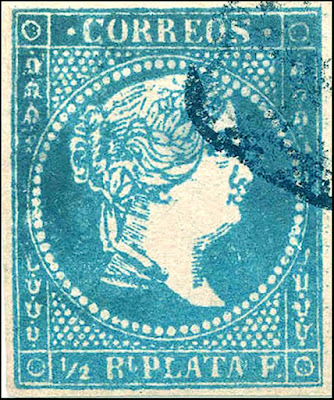Postal History
1855
Engraver: José Pérez Varela.
They were printed in sheets of 170 stamps on hand-made paper, of different thicknesses and shades, from the bluish to the cream. With watermark
1/2 R. Greenish blue (1,402,500 issued)
1/2 R. Olive green
1/2 R. Dark green
1/2 R. Blue
September 1855
Second issue put into circulation upon receipt of new quantities of stamps with the same characteristics as the previous ones. These were used only in Cuba.
1/2 R. Black blue (1,870,000)
1856
Engraver: José Pérez Varela.
Issue with the same designs as in 1855, but printed on white paper with different watermarks.
1/2 R. green blue
1/2 R. green black
1/2 R. green blue
1857
Engraver: José Pérez Varela.
New issue with the same designs as the previous ones, but printed on white paper without watermark and machine manufactured.
1/2 R. blue
1/2 R. ultramarine
1/2 R. light blue
On April 11, 1856, a circular was issued stating that due to the increasing need for postage stamps, the supply of hand-made paper was insufficient and that it had been decided to adopt machine made paper that lacked a watermark.
Accordingly, the lack of a watermark was a bonus to forgers and a large volume of forgeries quickly appeared.
The use of this unmarked paper was to be provisional, but in the ten years that this issue was in use, it remained on unmarked paper.
No other stamp under Spanish Domination ever had a watermark.
As of September 1, 1864, the stamps of this issue began to be exchanged for another with a different design.
 |
| Original Stamp |
NOTE - the center circle is deliberately off center slightly to the right
Common genuine cancels
The top left one can also be found in blue, red & green
There are an estimated 15+ different postal forgeries of this stamp.
Most are probably uncommon or unique.
The following are the common ones
Probably a Torres creation
Typographed on thin white paper
Typographed on thin white paper
- 2 pearls opposite the eye are joined
- The bottom of the L of PLATA has a very thin almost invisible line
- The ribbon end is a curved hook
- The flower at the base of the hair is a different shape
Postal forgery type II
Postal forgery type III
Possibly a Type IIIa
Forgery is typographed on medium white paper. Several shades of blue
- Letters in PLATA are uneven
- 2nd A left side is curved
- End of the ribbon is a large solid curved hook
Forgery is Lithographed on thick white paper. Light & dark blue
- Ribbon ends in a long thick point
- The lower pearls in the background are slanted
Details are sharper
Postal forgery type IV
Postal forgery type V
Postal forgery type VILithographed on medium white paper
Height is slightly shorter than original
Color shades of blue - blue-green
- In the flower at the hair bottom, only 1 short leaf is defined
- The lower leg of the L of PLATA curves up
- The eye is heavily shaded
This is by far the most common forgery and may be from Segui
It is lithographed on medium white paper in shades of blue and a gray
- The top O&S are too far apart
- 79 pearls in the circle compared to 73 in the original
- The pearls in the lower background touch the side frames
- The bottom right bell ornaments are 4 full ones instead of 3 1/2 as the original
- Eyelashes are pronounced
 |
| Type V pair |
This type appears generally heavily cancelled
Lithographed on medium white paper. Color is dull blue
- The bottom right bell ornaments are 4 full ones instead of 3 1/2 as the original. They are very poorly drawn
- The pearls in the background are very small
- Center circle is well centered
- The top of the circle and the frame are further apart
Overall a good forgery
- The stamp is wider than the original
- The circle is well centered
- The queen appears to be sneering
I was not able to classify the following
- The bottom letters are thick
- The eye is heavily shaded
- The pearls in the top & bottom are very uneven
- Frame lines are uneven and broken
- The face is heavily shaded
- The eye appears to be lacking a pupil
- The bell shapes are uneven
- The fraction is narrow
- The front of the eye is heavily shaded
- The top letters are thinner
The Queen's eye is very small.
There is a break in the white frameline below the P of PLATA.
The C of CORREOS has a larger top part and appears to slant to the right.
The 2 of 1/2 looks like a 3.
Forgeries Philatelic
These are forgeries intended for collectors
They appear to be far less common than the postal ones
This stamp is the first forgery mentioned in the Album Weeds
It has 78 pearls (instead of 73)
The queen appears to be squinting
Letters are uneven
The side ornaments are large
The Queen has a very pronounced chin
The eye is very different
The background behind the circle consists of lines.
The ribbon had no end
The bottom letters are thick
















